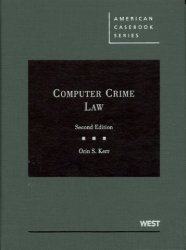$511.72
$511.72
(SAVE Now!)
as of 12/22/2024 (Details)
The second edition of Kerrs popular computer crimes text reflects the many new caselaw and statutory developments since the publication of the first edition in 2006. It also adds a new section on encryption that covers both Fourth Amendment and Fifth Amendment issues raised by its use to conceal criminal activity. Computer crime law will be an essential area for tomorrow's criminal law practitioners, and this book offers an engaging and user-friendly introduction to the field. It is part traditional casebook, part treatise: It both straightforwardly explains the law and presents many exciting and new questions of law that courts are only now beginning to consider. The book reflects the author's practice experience, as well: Orin Kerr was a computer crime prosecutor at the Justice Department for three years, and the book combines theoretical insights with practical tips for working with actual cases. No advanced knowledge of computers and the Internet is required or assumed This book covers every aspect of crime in the digital age. Topics range from Internet surveillance law and the Fourth Amendment to computer hacking laws and international computer crimes. More and more crimes involve digital evidence, and computer crime law will be an essential area for tomorrow's criminal law practitioners. Many U.S. Attorney's Offices have started computer crime units, as have many state Attorney General offices, and any student with a background in this emerging area of law will have a leg up on the competition. This is the first law school book dedicated entirely to computer crime law. The materials are authored entirely by Orin Kerr, a new star in the area of criminal law and Internet law who has recently published articles in the Harvard Law Review, Columbia Law Review, NYU Law Review, and Michigan Law Review. The book is filled with ideas for future scholarship, including hundreds of important questions that have never been addressed in the scholarly literature. The book reflects the author's practice experience, as well: Kerr was a computer crime prosecutor at the Justice Department for three years, and the book combines theoretical insights with practical tips for working with actual cases. Students will find it easy and fun to read, and professors will find it an angaging introduction to a new world of scholarly ideas. The book is ideally suited either for a 2-credit seminar or a 3-credit course, and should appeal both to criminal law professors and those interested in cyberlaw or law and technology. No advanced knowledge of computers and the Internet is required or assumed.
Technical Details
No features available.